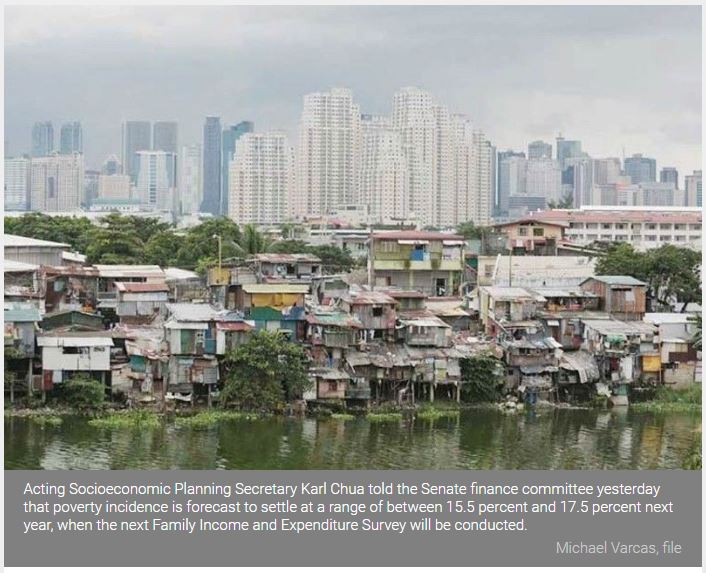Philippines: Poverty level seen to worsen to 17.5%
MANILA, Philippines — Poverty in the country can be expected to worsen next year as the jobs and livelihood of more people in urban areas are affected by the prolonged lockdown, the National Economic and Development Authority (NEDA) said yesterday.
Acting Socioeconomic Planning Secretary Karl Chua told the Senate finance committee yesterday that poverty incidence is forecast to settle at a range of between 15.5 percent and 17.5 percent next year, when the next Family Income and Expenditure Survey (FIES) will be conducted.
“We measure poverty every three years. The next measurement of poverty is in 2021. And our estimate right now is it can go between 15.5 percent to 17.5 percent,” said Chua.
Results of the 2018 FIES showed that poverty incidence fell to 16.6 percent in 2018 from the revised 23.3 percent in 2015. This meant some six million Filipinos were lifted out of poverty during that time.
Poverty incidence pertains to the proportion of Filipinos whose per capita income is not enough to meet basic food and non-food needs.
In turn, this translates to 17.6 million Filipinos living below the poverty threshold of P10,727 monthly for a family of five in 2018, the minimum income needed to satisfy basic food and non-food needs.
Before the pandemic, the Duterte administration targeted to bring down the poverty incidence to only 14 percent of the population, but Chua said this target may have to be revisited because of the economic fallout from the health crisis.
“Before COVID, we were on track to achieving the 14 percent poverty incidence or lower. However with COVID, we have to make adjustments and we are hoping these are temporary,” said Chua.
Poverty would rise faster in cities, he said, as lockdowns implemented to curb the transmission of the virus reduce mobility and diminish employment prospects.
In rural areas, particularly in agricultural communities, poverty would not worsen significantly as economic activity is not as affected by social distancing measures.
“There will be a temporary increase in poverty. And the profile of poverty, we have to distinguish between rural and urban poverty,” said Chua.
“Because of COVID, the quarantines are largely affecting the urban areas. We are fortunate to know that in the rural areas, particularly in agriculture, COVID is not threatening their livelihood. The threat is more on urban poverty.”
Poverty reduction figures are monitored by the market as an indicator of growth in consumption.
Source: https://www.philstar.com/business/2020/09/11/2041505/poverty-level-seen-worsen-175


 Thailand
Thailand




